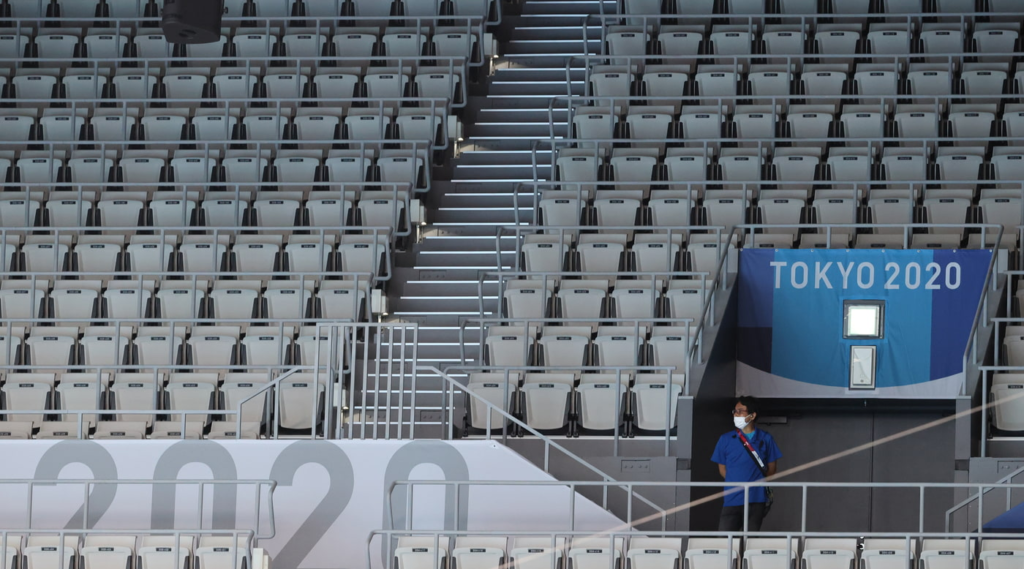Starting with the 1896 Olympics in Athens, Greece, the Olympics are held every four years. However, for the first time in history, the event was postponed for a year due to the pandemic of COVID-19, and the Olympic Games were held in Tokyo without the attendance. The Paralympics are still underway now.
The Tokyo Olympics, which was held under these special circumstances, heard their voices about how they were influencing Japan’s industrial sector and how they felt from the Japanese working in each industry.

He interviewed three companies in the industry: Elematec Co., Ltd (Global Trading Company under Toyota Group), Kotobuki-Trading Co., Ltd (importation and distribution of cosmetics materials), and Egami Corp. (manufacturing and selling hats, accessories, etc.).
The first company is Elematec, a trading company that purchases parts, finished products and technology from 7,100 buyers worldwide and sells them to 6,600 clients worldwide. Due to the hosting of the Tokyo Olympics, customs clearance is difficult due to increased security in terms of trade, but sales have risen in the TV industry, and there is no significant impact in other sectors.
However, it is said that sales are rising in the automobile industry, game machine industry, and mobile industry (smartphones, tablets, etc.) due to COVID-19. On the part of Trading Company, overall, it is producing pretty good business results this year. As demand for large and clean screens with sophisticated sound effects increases to watch the Olympic Games, LG and other large TV makers reportedly ordered a lot of related parts and materials such as speakers in May and June.
In addition, orders from automakers such as TOYOTA and NISSAN have been completed from October to November. This means that carmakers are buying automotive-related parts in advance to reduce the impact of car production which can be derived by lack of supply of automotive semiconductor parts due to COVID-19. In addition, as demand for game consoles such as SONY’s PlayStation or smartphones such as VIVO increases due to COVID-19, related components are also increasing in volume.
The second company, Kotobuki-Trading Co., Ltd., is a trading company that imports cosmetics ingredients from various countries and supplies them to companies around the world. It is said that the hosting of the Tokyo Olympics has no effect on the cosmetics industry. At the beginning of the Tokyo Olympics, people expected that the global game could result in some economic ripple effects, but after it was postponed for a year due to COVID-19 and most people had no outside activities, the demand for cosmetics has decreased, and the supply of cosmetics materials is also difficult. However, after the Tokyo Olympics, the cosmetics industry is expected to improve little by little. Murakami, who has been running the company for 70 years for three generations, has accepted the current situation calmly and is hoping that it will end soon.
Egami Corp., a third company, is a company that manufactures and sells hats, T-Shirts, character dolls, or keyholders with Japanese characters, etc. to foreigners visiting Japan. Egami said hosting the Tokyo Olympics had no effect on his business. Despite the fact that Harajuku in Tokyo, which has the largest number of foreign visitors in Japan, there are no foreigners at all. Originally, Harajuku is recognized as a hot place where foreigners must visit if they visit Japan, and there are many fashion boutiques, cafes, and restaurants, so it is famous for being crowded with many foreigners as well as Japanese. The shops on Takeshita Street, also known as the Main Store Street in Harajuku, have a significant monthly rent of at least 1 million yen (USD 9,109), which is why sales are so high due to a large number of customers.
However, since the outbreak of COVID-19, there have been no foreigners at all on Takeshita Street, and very few Japanese have been found. Despite the Tokyo Olympics being held, Harajuku says there are no banners or promotional materials related to the Tokyo Olympics. About 50 percent of Takeshita Street’s stores are closed, and Egami Corporation also has three employees all out of work and is making new challenges with his new business Item with his wife.
The hosting of the Olympics in Tokyo initially had high expectations, but even if the Olympics were held, the athletes from each country who visited Japan could not go outside from the athletes’ village or hotel where they stayed, so they could not see any foreign players on the street. (During the Tokyo Olympics, while the organizing committee was monitoring, the committee saw foreign athletes sneaking out of the accommodation. So he was forced to leave the accommodation and return home, which was a big issue.) Foreigners who live in Japan for a long time also do not move around at all, as the number of COVID-19 infections in Tokyo alone exceeds 5,000 a day.
Thus, the temperature difference between each industrial sector in Japan varies sharply, there is little ripple effect in the Japanese economy resulting from the Tokyo Olympics, and the negative ripple effect of the Japanese economy by the COVID-19 outbreak is more significant. We hope that the end of COVID-19 will come as soon as possible, so that companies around the world as well as in Japan will recover as soon as possible.
Mike Choi
Asia Journal

